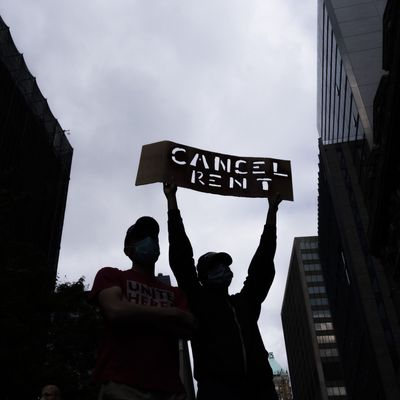
At midnight on Friday, a federal moratorium on evictions will end. Similar bans by state and local governments have already passed or will soon expire. With tens of millions of Americans seeking jobless benefits, and the federal unemployment-insurance bonus set to expire, many American renters will soon be at risk of losing their homes.
“This is a potential catastrophe,” Senate Minority Leader Chuck Schumer said this week. Here’s where the looming crisis stands as the federal moratorium is set to expire.
What did the CARES Act eviction moratorium do?
It protected people from eviction if they live in homes or apartments with a federally backed mortgage. According to one estimate, that amounted to roughly 12.3 million units, home to just over a quarter of the country’s renters. There were problems with the law, though. Apart from leaving three-quarters of the country’s renters exposed to evictions, there was also no enforcement mechanism or penalty for landlords who attempt illegal evictions.
That’s led to cases like Yolanda Jackson’s. She received an eviction notice in late June, with the manager of her apartment claiming the moratorium did not apply. But Jackson, who shared her story with the New York Times, received help from Legal Aid in Atlanta after the group’s lawyers found that the apartment manager was wrong.
Similar situations have taken place across the country. The Fort Worth Star-Telegram recently dug into eviction cases in Tarrant County. The paper found that of 942 evictions filed between June 1 and July 14, at least 119 “were filed at properties that appear to be covered under the CARES Act.”
State and local government also issued their own moratoriums on evictions that applied to all renters within their borders. But some of those expired months ago. In Wisconsin, a statewide eviction moratorium ended in late May, leading to 1,447 eviction filings in Milwaukee in June. That’s 17 percent higher than the average.
What happens once the moratorium expires?
Landlords will be able to file eviction notices but can’t push people out of their homes just yet. Renters will be given another 30 days until that happens. Renters could also be hit with a big bill. While the moratorium prevented evictions, it did not prevent the accumulation of rent payments.
How many people are at risk of eviction?
Overall, as many as 23 million renters could be evicted by the end of September, according to the COVID-19 Eviction Defense Project. That’s roughly the same number of Americans who lack confidence in their ability to make rent next month, according to recent Census Bureau data.
Naturally, the higher the unemployment rate, the higher the expected number of evictions. That is especially true with the federal unemployment-insurance bonus set to expire at the end of this month. Already, one in five renters are behind on their payments, Sharon Parrott of the Center on Budget and Policy Priorities said this week. More will join them with the end of the unemployment bonus, which will lead jobless benefits to fall by as much as 85 percent.
Black and Latino renters are likely to be hit hardest once evictions ramp up. In a U.S. Census Bureau survey last month, half as many white renters said they were worried about making their next payment compared to Black and Latino renters.
For some renters, surges in coronavirus cases around the country have complicated the prospect of getting back to work. In Texas, for example, reopening measures have been rolled back in recent weeks, with bars closing and restaurant capacity reduced. But Houston eviction courts remain busy.
What are lawmakers doing about it?
In late June, House Democrats passed the Emergency Housing Protections and Relief Act of 2020. The bill sets aside $100 billion for emergency rental-assistance programs and extends the CARES Act eviction moratorium through March of next year. The Senate doesn’t seem warm to taking up the bill, though.
Democrats in the Senate, meanwhile, have a handful of proposals. The RELIEF Act, introduced by Senator Kamala Harris, would bar evictions for a year and give renters 18 months to catch up on their payments. Senator Elizabeth Warren has a bill that would expand eviction protections to most renters in the country.
It’s unclear if eviction protections will be included in the next coronavirus relief bill, but it doesn’t seem promising.





























